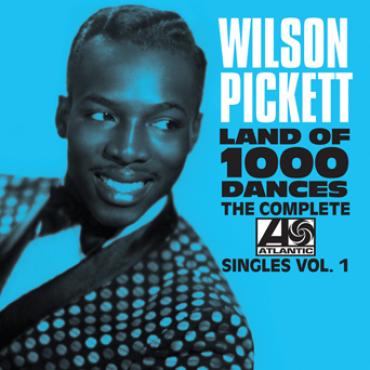Wicked Pickett’s Atlantic Soul

He was the original black panther. He didn’t wear a uniform or make political statements. But Wilson Pickett’s voice was heard by millions, and his message moved people as much as any political rhetoric.
Atlantic Records‘ Jerry Wexler, co-founder of and producer of most of Pickett’s hits, first came up with the panther image, recalling the first time he saw Pickett glide into a room, looking sleek, black and dangerous.
But it was more than just a look. Pickett’s scream was unassailable and unmistakeable, a blood–curdling yowl that raised your hackles; a primal, feral sound that made you look around for a place to dive into or clamber up to avoid those claws that had to be close behind. And Pickett had a personality that matched his scream. Fame Studio founder Rick Hall recalls Pickett offering to kick people’s asses several times during his recording sessions there, and Pickett braggged of putting a .45 to a former label boss’ head to get out of his contaract before signing with Atlantic.
Pickett died in ’06 at the age of ’64, leaving behind a legacy of scalding soul that still stands up today.
Real Gone Records has undertaken the ambitious project of collecting every single Pickett made for Atlantic from ’64- ’73, re-issuing them in three volumes. Volume one goes through ’67, and includes most of the stuff that made him famous.
Like many soul men, Pickett started in gospel, singing with the Violinaires. But after he left in ‘59 to join the Falcons, Pickett’s lead on ’62’s “I Found A Love” made it an instant soul classic. Signing to Atlantic in ’64 , he had a double–sided hit his first time out with two tunes he co-wrote, “Cry Baby,” and “For Better Or Worse.” Both are churchy sounding, with a choir wailing soulfully behind him as Pickett preaches the gospel of wicked Pickettness.
This stuff sounds great, re-released in mono as it was on the original 45s, producing a crisp, clean sound that lets every nuance of the great arrangements shine through.
Pickett did many of his hits with the help of Steve Cropper and Stax Records house band, Booker T and the MGs,who also backed Otis Redding. Cropper and Pickett colloborated on one of Pickett’s biggest hits, “In The Midnight Hour.” Cropper says the song was originally a hymn Pickett cut in his gospel days about seeing Jesus in the midnight hour and got transmogrified into his love comin tumblin’ down at the witching hour. As great as Pickett’s vocals are, the arangements on the Stax cuts are a major part of the appeal. Perfectly punctuated by the Memphis horns, Andrew Love on tenor sax and Wayne Jackson on trumpet, underscored by Al Jackson Jr.’s ‘relentless sledgehammer beat, Duck Dunn’s bass weaving around him and Cropper pulling the strings,the band keeps Pickett centered in the sweet spot.
For many of us, it was the soundtrack of our lives, pounding out of a car radio or blasting from the tinny speaker of a battery-powered, portable 45 player balanced on a trunk lid at a local watering hole. Even if you don’t know a thousand dances, you can’t help but try to do something when this stuff comes on. “99 And A Half,” “Mustang Sally,” “I Found A Love (Parts 1 and 2,) “Dont Fight It”- all sound as good today as they did back then. Even though your body might be a little slower to act on them, they still create the same urges. And if your attempts to get in the groove don’t go as easily as they did back in the day, not to worrry. Just go for it, and follow Pickett’s advice: “You can’t fight it – you got to feel it.”



